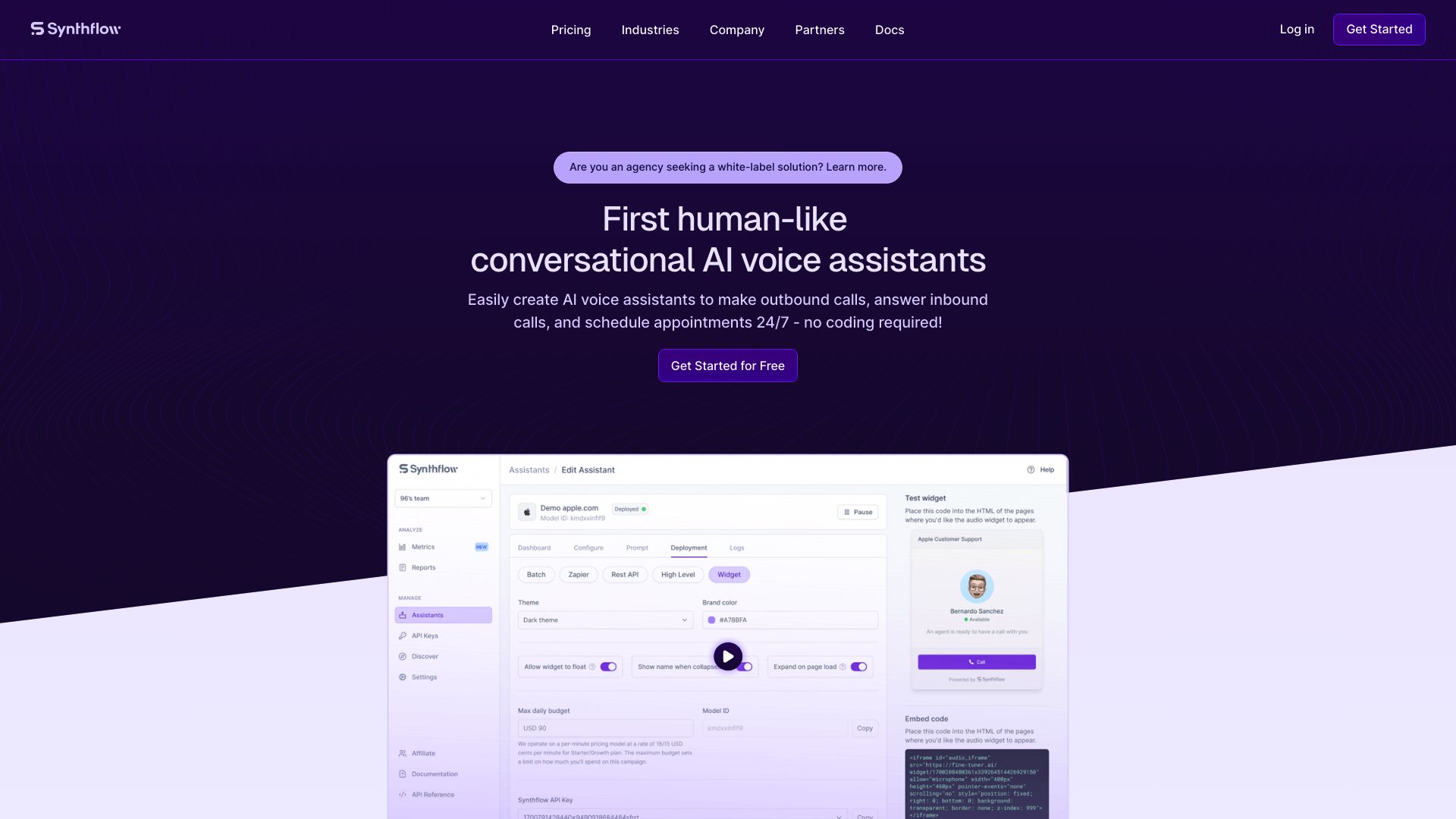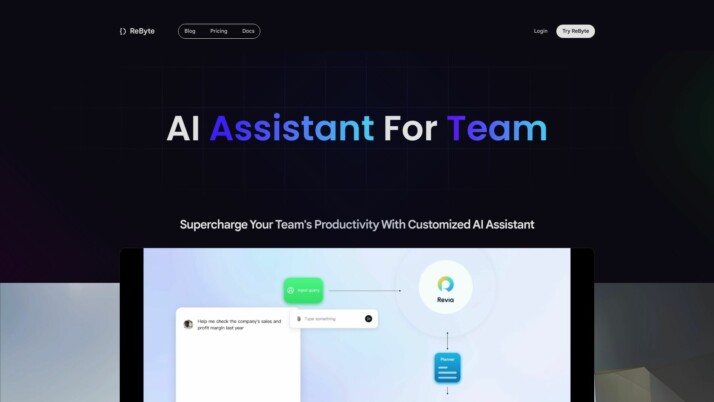Synthflow vs. Rebyte: Comprehensive AI Platform Comparison
Artificial intelligence powers the future of business productivity, but finding the right AI development platform can challenge even seasoned tech professionals. Our in-depth comparison of SmythOS, Synthflow vs. Rebyte cuts through the marketing hype to reveal how these leading platforms stack up for building sophisticated AI agents and applications. We examine each solution’s key capabilities around multimodal interactions, model integrations, security controls, and no-code development tools. Whether you’re a developer seeking granular customization or a business user looking for rapid deployment, this guide equips you to choose the AI platform that best fits your needs and use cases. Discover which solution delivers the ideal balance of power, flexibility and ease-of-use to accelerate your AI initiatives.
Synthflow Overview
Synthflow empowers businesses to create customizable AI voice assistants without coding expertise. The platform’s no-code interface and pre-built templates make it accessible to users with minimal technical background, enabling the deployment of AI assistants with distinct personalities and capabilities aligned with specific brand needs.


Synthflow’s AI assistants excel in various tasks, including customer support, lead generation, appointment scheduling, and issue triaging. The platform prioritizes data privacy and security, offering unlimited secure storage in a dedicated Pinecone environment. Integration capabilities with tools like 11Labs and Twilio enhance functionality, allowing seamless incorporation into existing workflows.
Synthflow empowers businesses to create customizable AI voice assistants without coding expertise… enabling the deployment of AI assistants with distinct personalities and capabilities aligned with specific brand needs.
Key features of Synthflow include batch deployment for large-scale communication campaigns, real-time interaction through website widgets, and comprehensive documentation to help users maximize the platform’s potential. The visual builder simplifies the creation and management of AI agents, while the platform’s ability to maintain context within conversations improves interaction quality.
While Synthflow offers robust voice AI capabilities, it lacks explicit support for multimodal interactions combining text, voice, and visual inputs. The platform also doesn’t provide foundation AI models or direct integration with Huggingface AI models, which may limit some advanced AI applications. However, Synthflow’s focus on voice assistants and its user-friendly approach make it a strong choice for businesses seeking to enhance customer interactions and operational efficiency through AI technology.
Rebyte Overview
Rebyte empowers users to create AI-powered applications without extensive coding skills. The platform’s visual agent builder allows for the development of customizable AI agents with complex backend logic using large language models. Users can design fully customized interfaces for these agents without writing code, integrating with private data sources for enhanced functionality.


Rebyte empowers users to create AI-powered applications without extensive coding skills.
Rebyte’s serverless runtime facilitates production deployment and scaling of AI agents, managing the entire lifecycle from development to deployment. The platform provides detailed observability into every step of an agent’s operation, ensuring transparency and ease of troubleshooting.
Key features of Rebyte include a no-code interface for creating and managing AI agents, support for multiple environments (development and production), and the ability to maintain context within conversations. The platform enables autonomous agents capable of performing tasks like appointment scheduling and customer support without human intervention. Rebyte also supports multi-agent collaboration, allowing teams of AI assistants to work together on complex workflows.
While Rebyte excels in creating voice AI assistants and integrating with various APIs and RPA tools, it lacks some advanced features like multimodal interactions and support for foundation AI models. The platform prioritizes data security through encryption and supports OAuth for secure authentication, but does not offer specific IP control features.
Rebyte positions itself as a tool to democratize AI development, enabling knowledge workers and teams to automate workflows and boost productivity through no-code interfaces. Its focus on end-user programming through AI sets it apart in the market, aiming to usher in an era where anyone can rapidly transform ideas into deployed AI applications.
Rebyte positions itself as a tool to democratize AI development, enabling knowledge workers and teams to automate workflows and boost productivity through no-code interfaces.
Feature Comparison
SmythOS and Rebyte offer powerful platforms for building AI agents, but with some key differences in capabilities. SmythOS provides a more comprehensive set of features for developing and deploying sophisticated AI applications.
SmythOS excels in its multimodal capabilities, supporting interactions combining text, voice, and visual inputs. This allows for more versatile AI agents that can handle complex, multi-format data. Rebyte, while strong in natural language processing, lacks explicit support for multimodal interactions.
In terms of AI model support, SmythOS integrates with a wide range of foundation models from different providers like OpenAI, Anthropic, and Hugging Face. This gives users more flexibility in choosing and customizing AI models for their specific needs. Rebyte focuses primarily on large language models but does not offer the same breadth of AI model options.
SmythOS also differentiates itself with advanced security features like IP control and comprehensive data encryption. While both platforms prioritize data security, SmythOS provides more granular controls for enterprise-grade protection. Rebyte offers solid security measures but lacks some of the advanced options found in SmythOS.
For developers and technical teams, SmythOS offers more extensive customization capabilities and API integrations. Its visual builder supports complex backend logic and workflows, catering to users who need fine-grained control over their AI agents. Rebyte’s visual builder, while user-friendly, may not offer the same level of advanced customization for complex use cases.
Both platforms excel in no-code/low-code development, making AI accessible to non-technical users. However, SmythOS’s drag-and-drop interface and pre-built components provide a more comprehensive toolkit for rapidly building and deploying AI agents across various use cases and industries.
Feature Comparison Table
| Synthflow | Rebyte | SmythOS | |
|---|---|---|---|
| CORE FEATURES | |||
| Autonomous Agents | ✅ | ❌ | ✅ |
| Multimodal | ❌ | ❌ | ✅ |
| Multi-Agent Collaboration | ✅ | ❌ | ✅ |
| SECURITY | |||
| Constrained Alignment | ✅ | ❌ | ✅ |
| Data Encryption | ✅ | ❌ | ✅ |
| OAuth | ✅ | ❌ | ✅ |
| IP Control | ❌ | ❌ | ✅ |
| COMPONENTS | |||
| Huggingface AIs | ❌ | ❌ | ✅ |
| Classifiers | ❌ | ❌ | ✅ |
| Logic | ✅ | ❌ | ✅ |
| Data Lakes | ❌ | ❌ | ✅ |
| DEPLOYMENT OPTIONS (EMBODIMENTS) | |||
| Deploy as Webhook | ✅ | ❌ | ✅ |
| Staging Domains | ❌ | ❌ | ✅ |
| Production Domains | ❌ | ❌ | ✅ |
| API Authentication (OAuth + Key) | ✅ | ❌ | ✅ |
| Deploy as Scheduled Agent | ✅ | ❌ | ✅ |
| DATA LAKE SUPPORT | |||
| Sitemap Crawler | ✅ | ❌ | ✅ |
| YouTube Transcript Crawler | ✅ | ❌ | ✅ |
| URL Crawler | ❌ | ❌ | ✅ |
| PDF Support | ❌ | ✅ | ✅ |
| Word File Support | ❌ | ✅ | ✅ |
| TXT File Support | ❌ | ✅ | ✅ |
Best Alternative to Synthflow and Rebyte
SmythOS stands out as the superior alternative to Synthflow and Rebyte for AI agent development and deployment. Our platform combines powerful features with unmatched ease of use, making advanced AI capabilities accessible to users of all skill levels.
We offer a comprehensive suite of tools that surpass the limitations of Synthflow and Rebyte. Our drag-and-drop interface allows rapid creation of sophisticated AI workflows without coding, while still providing the flexibility for advanced customization. This empowers both non-technical users and experienced developers to build AI solutions tailored to their specific needs.
SmythOS stands out as the superior alternative to Synthflow and Rebyte for AI agent development and deployment. Our platform combines powerful features with unmatched ease of use…
Unlike Synthflow and Rebyte, SmythOS excels in multimodal capabilities, supporting seamless integration of text, voice, and visual inputs. This versatility enables the development of more advanced and intuitive AI applications across diverse use cases. Additionally, our platform integrates with a wide range of foundation models from providers like OpenAI, Anthropic, and Hugging Face, offering unparalleled flexibility in AI model selection and customization.
SmythOS prioritizes enterprise-grade security and scalability. We provide robust features like IP control, comprehensive data encryption, and OAuth integration, ensuring your AI deployments meet the highest standards of data protection and compliance. Our platform also offers unmatched scalability, supporting everything from small-scale prototypes to large-scale enterprise deployments with ease.
With SmythOS, users gain access to a rich ecosystem of pre-built components, templates, and integrations that accelerate development and expand possibilities. We enable seamless deployment across multiple channels, including APIs, webhooks, chatbots, and scheduled agents. This flexibility, combined with our intuitive interface and powerful capabilities, makes SmythOS the ideal choice for organizations looking to harness the full potential of AI technology efficiently and effectively.
Conclusion
SmythOS, Synthflow, and Rebyte each offer unique approaches to AI agent development, but SmythOS stands out with its comprehensive feature set and versatility. While Synthflow excels in voice AI assistants and Rebyte focuses on no-code AI application development, SmythOS provides a more robust platform for creating sophisticated, multi-purpose AI agents.
SmythOS’s drag-and-drop interface, extensive integrations, and support for multiple AI models make it accessible to both technical and non-technical users. Its ability to handle multimodal interactions, coupled with advanced security features and scalable deployment options, positions it as a leader in the field.
For businesses seeking a powerful, flexible AI solution, SmythOS offers unparalleled capabilities. Its visual builder supports complex workflows, while pre-built components accelerate development. The platform’s emphasis on multi-agent collaboration and autonomous problem-solving opens up new possibilities for AI-driven innovation across industries.
To experience the full potential of AI agent development, explore SmythOS’s diverse range of AI-powered agent templates. These templates cover multiple business categories and offer a quick start to revolutionizing your workflows. Ready to take the next step? Create a free SmythOS account and start building AI agents with no time limit – experience the future of workforce automation risk-free.
Last updated:
Disclaimer: The information presented in this article is for general informational purposes only and is provided as is. While we strive to keep the content up-to-date and accurate, we make no representations or warranties of any kind, express or implied, about the completeness, accuracy, reliability, suitability, or availability of the information contained in this article.
Any reliance you place on such information is strictly at your own risk. We reserve the right to make additions, deletions, or modifications to the contents of this article at any time without prior notice.
In no event will we be liable for any loss or damage including without limitation, indirect or consequential loss or damage, or any loss or damage whatsoever arising from loss of data, profits, or any other loss not specified herein arising out of, or in connection with, the use of this article.
Despite our best efforts, this article may contain oversights, errors, or omissions. If you notice any inaccuracies or have concerns about the content, please report them through our content feedback form. Your input helps us maintain the quality and reliability of our information.
